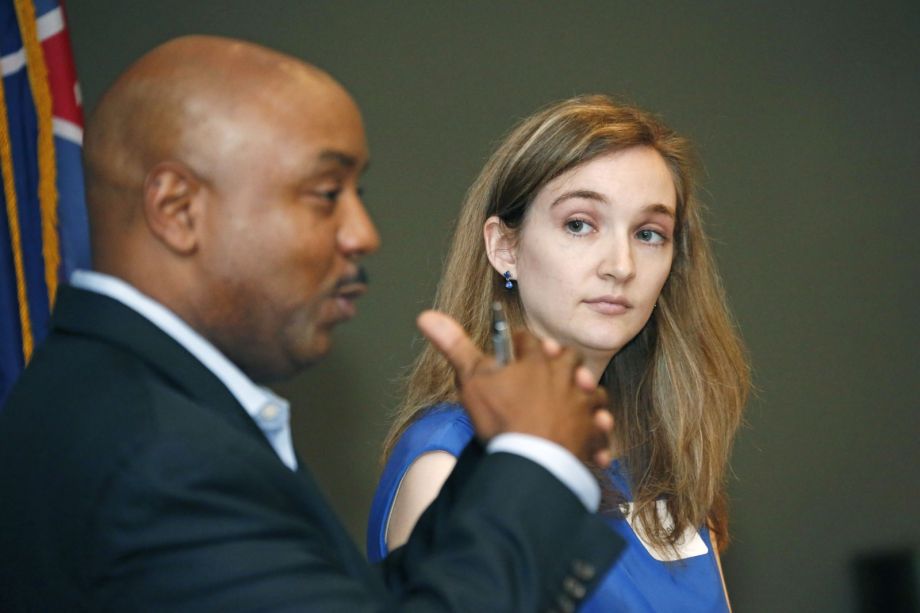Are You A Vanguard? Applications Now Open
This is your first of three free stories this month. Become a free or sustaining member to read unlimited articles, webinars and ebooks.
Become A MemberThis story was produced in collaboration with The Hechinger Report, a nonprofit, independent news website focused on inequality and innovation in education.
Babak Mostaghimi never expected to settle down in the rural Mississippi Delta. A native of Virginia, he graduated from Johns Hopkins University in 2006 with a high-paying job offer as a defense contractor at a consulting firm. On a whim, Mostaghimi also applied to Teach For America (TFA), a 24-year-old program that recruits mostly young, successful college graduates to teach in low-income, underperforming schools.
Mostaghimi realized that it might be his only opportunity to work with kids, a longtime passion. He accepted the offer.
His friends and family were appalled, he said: “They were like, ‘You just turned down that paycheck for a teaching job in rural Mississippi?’” After two years of teaching in the Magnolia State followed by two years of graduate school at Harvard, Mostaghimi returned to the Delta, one of the poorest regions of the country, where access to healthcare, healthy foods and good schools is lacking.
“I realized as a teacher, I could have a great impact, but very temporary impact,” Mostaghimi said. “Because there’s systemic problems … there’s a bigger problem here that needs fixing.”
Mostaghimi, 30, now lives on a modest tree-lined street in the town of Cleveland with his wife and toddler, and works as director of community, family and school engagement for the Jackson-based Center for Education Innovation, a nonprofit that focuses on community engagement and education reform. Part of his job is to listen to the concerns and ideas of residents in Duncan, Shelby, and Alligator, a string of blink-and-you’ll-miss-it towns off Highway 61 in a stretch of lush Delta land between Cleveland and Clarksdale. He’s helped the three communities form a coalition, apply for grants and start neighborhood initiatives to combat issues from health and exercise to littering.
He’s part of a small but growing group of Teach For America alumni in Mississippi who were so influenced by their exposure to the state’s daunting education challenges they’ve decided to stay and try to create broader, systemic change.
Today, the alumni who have stayed number 160 out of the 2,000 young teachers who have cycled through the Mississippi Delta region since TFA began sending teachers to schools there in 1993.
It is a small number, yet the group of young professionals — most of whom work in schools or education reform — holds an outsized influence in a state of 3 million residents that between 2000 and 2010 was one of just two in the Southeast that lost more people than it gained.
Bad schools are one reason for outsiders to avoid the state and for current residents to leave. “Limited job opportunities, isolation, low quality of education, those are all factors that push people away,” said John Green, the director of the Center for Population Studies at the University of Mississippi.

Mississippi was one of just two states in the Southeast that lost more people than it gained between 2000 and 2010.
But the implications of the TFA migration extend beyond the state’s classrooms, where high poverty rates and entrenched patterns of segregation have kept academic achievement at bay. (Two decades after TFA began sending its teachers to fill vacant teacher positions, Mississippi’s kids remain at the bottom in literacy and math scores.)
Teach for America, after all, is not solely about teaching. The organization tends to recruit top graduates who have proven records of leadership ability and academic and work achievement. In recruitment interviews, applicants are asked about situations where they have demonstrated perseverance and an ability to motivate others. The government-and corporate-funded nonprofit has long harbored ambitions to fuel “long-term impact” by developing alumni who potentially will go on to influence policy. No doubt, it has succeeded in recent years with alumni climbing into powerful positions across the nation, enacting and even spearheading controversial reforms. Even in other Southern states, Teach For America alumni have catapulted into positions of power. Kevin Huffman, Tennessee’s education commissioner, was one of Teach For America’s earliest corps members in Houston. John White, Louisiana’s state superintendent of education, taught in New Jersey with Teach For America.
In Mississippi, Teach for America’s 303 active corps members make up a small percentage of teachers statewide. Yet, the organization is a political force in the state, receiving $6 million of Mississippi’s $2.3 billion 2014 K-12 education budget to support costs to recruit and train corps members, and winning mentions in speeches by Mississippi’s Republican governor Phil Bryant.
And like in other states, corps members are climbing the ranks. New recruits often hear about Michael Cormack, who started his teaching career in the state in 2003 and is now the executive director of a private organization that has been given control of two Mississippi schools, and about 2007 alumnus Matty Bengloff, the manager of a large federal grant for the Clarksdale School District and the owner of a frozen yogurt shop around the corner from Mostaghimi’s Cleveland home.
There have also been significant policy changes won partially through the work of TFA alums like Rachel Canter and Sanford Johnson.
Both of them — Mississippi natives who moved out of state for university and returned as TFA corps members — left the classroom after their two-year placement to pursue policy reform. Through their education nonprofit, Mississippi First, the pair has succeeded in increasing access to sex education in the state, winning federal funding for low-income schools, helping develop and pass legislation to legalize new charter schools and, crafting the legislation that created the state’s first-ever state-funded pre-kindergarten program, which debuted at the start of the school year in August.
This fall, Mississippi First is providing technical assistance to the state as it works out the early kinks in the program, which this year will serve more than 2,000 children, or about 6 percent of eligible children in the state.

Rachel Canter, right, executive director of Mississippi First, speaks to state legislators with Ken Campbell, president of the Black Alliance for Educational Options, left, about the process of opening a charter school in Mississippi, with (AP Photo/Rogelio V. Solis)
“A big problem in Mississippi, and certainly in the government, is that you have people who sit up in their ivory towers and they haven’t been down in the classroom or on the ground,” said Brice Wiggins, the state legislator from southern Mississippi who introduced the pre-K legislation crafted by Canter. “To do this type of policy, it takes people outside of the elected officials. We just don’t have the resources or the expertise.”
On a recent afternoon, Mostaghimi turned off Highway 61 onto a long, windy road, which hugs a brown river leading to the town of Alligator, one of the Delta towns where Mostaghimi works. Only 208 people live in Alligator, and Mostaghimi is a familiar face to most of them. He stopped his car outside a gray, decrepit wooden building, where three young men were sitting on the steps.
They waved as Mostaghimi rolled down the passenger window. “How’d you break your hand?” he called out to one of the men, who was wearing a cast.
“Fighting,” the young man answered.
“Hey!” the second young man called out. “You remember me?”
“Jacquavis,” Mostaghimi responded, without missing a beat.
The young man grinned and Mostaghimi waved before driving further down the road, past the center of town, which consisted of a general store, some boarded-up buildings and an old, brick post office. He turned into a small parking lot by a cluster of single-level brick homes, where a family was sitting outside in the shade as children played on a large lawn between houses. He stepped out of his car and waved to the family. Children eagerly ran up to say hello.

Babak Mostaghimi, pictured at Town Hall in Duncan. Mostaghimi works with residents of Duncan through a grassroots coalition organized in hopes of improving education and community health in the region.
A big part of Mostaghimi’s job is helping community members advocate for better schools. No one can argue the work isn’t needed. Even years after drastic reforms like the 1982 Education Reform Act, which mandated school attendance and established statewide kindergarten, Mississippi test scores and graduation rates lag behind other states.
The state’s public school system remains largely segregated and black students continue to fare worse economically and academically than white students. In the 2011-12 school year, only 69 percent of black public school students in Mississippi graduated from high school within four years, compared to 82 percent of white students. In 2013, nearly 90 percent of the state’s African-American fourth-grade students scored below proficient on a national reading assessment, compared to 67 percent of white students.
“For 21 years we’ve been focused on two years in a classroom,” Mostaghimi said, referring to TFA’s tenure in the state. “Look around you, this is 21 years of work. I don’t think anyone would call this a success.”
Last year, the Center for Education Innovation created easy-to-read “education scorecards” for every school district in the state so that parents — many lacking high levels of literacy or regular access to the Internet — would have clear information about test scores, graduation rates and teachers. The hope is that parents will get more involved and advocate for better schools and communities. They’ve also worked with low-performing districts to create “community engagement councils,” something that is a state requirement for all districts that receive a rating below a “C” on an A-to-F scale.
In working with these councils, Mostaghimi said his role is not to suggest policy changes, but rather to support the community’s ideas for how to improve their schools and provide “technical support” when they find a solution. “For something to succeed, it has to genuinely address a community concern, and it genuinely has to be a community idea,” he said. In one district, that meant providing support when parents wanted to apply for grants to fund a school nurse, a position that had long been empty in the local schools.
This point is particularly salient in Mississippi, a state that has only slightly more residents than the city of Chicago and a local political culture that is just as insular.
The policies TFA alumni tend to push often shake the political and civic fabric of towns that haven’t seen much change for years. When a charter school is proposed for a town that has had the same school serving the same neighborhoods for generations, long-standing alliances are tested. Often, the reforms that TFA recruits and alums want to see, like charter schools, are not the same as the goals of community members and are seen as a threat to resources already spread too thin.
Other divisions break out over cultural norms and issues like corporal punishment, which has long been a staple of discipline manuals in many schools in the South, but can disturb educators who were raised to find such acts abhorrent.
John Green from the Center for Population Studies said TFA’s presence is complicated by past events and movements in Mississippi. “What may be a bit unique to Mississippi and other rural Southern communities is the experience that locals have had with outsiders coming in, thinking they are going to ‘save’ the place and then moving on,” Green said. “I think there is considerable room for people with new ideas and talent to help improve education. The challenge is for them to figure out how to do so in a way that is supportive of and not off-putting to local residents.”

Matty Bengloff moved to the Delta to join TFA. After finishing his two years as a teacher, he took over the management of a large federal grant for the Clarksdale School District and opened a frozen yogurt shop in Clarksdale.
Though the particularities may be unique to Mississippi, similar tensions play out elsewhere.
In New Orleans, there has been friction over the role TFA has played in reshaping the city’s long-troubled public school system following Hurricane Katrina in 2005.
The debate is highly racialized. A large number of the 7,000 school employees who lost their jobs after Katrina were black; in the years since, TFA’s predominantly white presence has mushroomed from 85 teachers before the storm to more than 300 today, with another 860 alumni present in the region. Thirty of those alumni run schools in New Orleans.
TFA has prioritized diversifying its ranks and this year welcomed what it called its most diverse crop of recruits. Yet with half of the 5,300-teacher group identifying as people of color and 22 percent identifying as African-American, disparities remain. In New Orleans, beyond race, there is a perception that the teachers, most of them from outside the state and alumni of competitive universities, will not stay in the city.
“I think it’s a terrific program,” Sharon Clark, principal at Sophie B. Wright Charter School in Uptown told the Times-Picayune. “These people bring a lot of energy and creativity, but I need people who are going to stay and invest in this community.”
For many opponents of TFA, especially in the South, it’s easy to see the program as a two-year detour on the way to a prestigious law school or medical school.
The critique has merit. One study found that about 44 percent of TFA teachers nationwide remain in their assigned region and teach in their placement school for a third year, but less than 15 percent remain five years later.
In Mississippi, though, only 30 percent of TFA teachers stay in the state for a third year, and not necessarily as teachers, said Elizabeth Harris, director of District and Alumni Partnerships for TFA’s Mississippi Delta Region. The five-year retention rate is even lower.
“Is it desirable that there be an institutional mechanism which brings new teachers on the playing field, exposes them to the conditions that there really are, and results in many of them staying and really doing good stuff? How can anyone say, ‘No that’s a bad idea?’” said Mike Sayer, senior organizer at Southern Echo, a black leadership organization based in Jackson. “But in our experience, most of them leave.”
In Mississippi, TFA is confronting criticism with a focused strategy of education and recruitment of native Mississippians. They are encouraged to forge relationships with people outside of their school community and after their assignments are completed to apply to jobs and programs at universities and nonprofits that have deep roots in Mississippi communities.
“We’re trying to plant seeds sooner,” said Harris.
This summer, TFA asked Mostaghimi to talk to new recruits during their first week of orientation in Mississippi. “We asked him to help us share that message: build relationships with people, make this your home. Don’t think of this as a temporary layover,” Harris said.
“There’s a bigger problem here that needs fixing.”
The power of organizing could be seen this past June in the Delta town of Marks, where alum Michael Cormack worked as a principal for several years before leaving to run an established literacy organization, which has had a long partnership with Cormack’s school. There, community members confronted a school board member and convinced him to change his vote overnight to approve a new principal when Cormack left, and also convinced the school board member to vote to renew the school’s partnership with that literacy organization.
“If all of a sudden you have 80 people talking about [one issue] you’re swaying popular opinion,” Mostaghimi said.
Bill Luckett is the mayor of the Delta blues town of Clarksdale, about 37 miles northeast of Cleveland. He is happy to see TFA teachers and alumni settle in his town. “They live here just like anyone else,” said Luckett, a Democrat. “They shop here, they buy groceries … you’ve got a good tenant if you’ve got a TFA corps member renting from you.”
But while he hopes local TFA teachers will vote and create political change in the conservative state, he is realistic about the scale of influence the organization’s members have. “Most of them are not here long enough to get into the political side of things,” he said.
That must change if TFA alumni want to see social impact, Mostaghimi said, since simply sending teachers into low-performing schools year after year hasn’t necessarily improved education in the state.

Even a small number of new residents can make a big difference in a small town like Shelby, pictured here.
When I joined TFA in 2009, the program seemed like the best way to get a teaching job. I was studying elementary education at a university in Los Angeles, and the Los Angeles Unified School District was in the midst of teacher layoffs, which didn’t inspire much hope for someone graduating thousands of dollars in debt.
I was assigned to teach special education in Charlotte, N.C. Even though my school was shut down for low-performance at the end of my second year, I knew I wanted to stay involved in education and do something about the inequities I had witnessed.
But instead of learning about opportunities to stay in Charlotte and build on relationships I had with my students and their families, my peers and I were inundated with lucrative offers from graduate programs, corporations, and charter schools across the country that wanted TFA alumni. Needless to say, I didn’t stay in Charlotte. Instead, I earned a Master’s degree in journalism at Columbia University and applied for jobs where I could report on the inequity I witnessed in the classroom.
Alum Rachel Canter’s experience is pretty much the opposite of mine. The differences between our experiences illustrate why TFA’s new strategy of recruiting natives who may be more invested in regions like the rural South, just may work. Canter grew up in Starkville, the home of Mississippi State University, and attended college at the University of Pennsylvania. As an undergraduate she returned home for a summer internship at the governor’s office to work on education issues. That’s when, she said, she realized the state lacked solutions for its education system.
As soon as she graduated, Canter moved back to Mississippi to join Teach For America. She joined with a childhood friend, Sanford Johnson, who had also left the state to attend college at Auburn University in Alabama. “For me and Sanford, we didn’t get recruited to TFA with the idea we were going to go somewhere and have this exotic experience. We chose to do TFA to give back to the place we grew up,” Canter said.
Canter opted to leave the classroom after her two years with TFA because, as she put its, she wanted to “build a movement” with Johnson.
Canter applied for a graduate program at the Kennedy School of Government at Harvard to learn how to start and sustain a nonprofit. She wrote the business plan for Mississippi First, now a Jackson-based education-policy and research nonprofit, while getting her masters in education policy. A partner at a Boston-based private equity firm provided the nonprofit’s start-up funds.
When she returned to Mississippi in 2008, Canter and Johnson, who was finishing graduate school at the University of Arkansas, looked for education issues that had the potential to be “transformational.” Eventually, they chose to focus on prekindergarten and charter schools, two issues “that were at a point where with a little concerted effort and the right kind of thinking, we thought we could really advance the ball.”
In 2012, Canter had written a white paper on pre-K, which included suggestions for how Mississippi should design its program. Wiggins asked her to draft the pre-K legislation, even though at the time, she had never written a bill. In 2013, the state legislature passed the Early Learning Collaborative Act of 2013, modeled after the report published by Mississippi First.
Elizabeth Harris, director of alumni and district partnerships from Teach For America Mississippi said the organization is proud of such efforts, but cautions against describing success stories like Canter and other alumni as a ”movement.”
“I’ve felt like that makes it sound like we are the only people who care about what’s going on in Mississippi,” Harris said. “I don’t think alumni are the only ones who are part of the movement, and I don’t think alums are the only ones who care. I do think they are the catalyst for an awful lot of momentum currently.”
Harris, who is also a Mississippi native who left the state for college and returned to teach, added that Canter’s bills spurred other alumni to get more involved in education policy and reform. Mississippi native Erika Berry, who taught with Teach For America in North Carolina, became the executive director of the Mississippi Charter School Association in 2013, which oversees the implementation of the state’s charter school law. Alumna Krystal Cormack, who joined TFA in 2004 and taught in the Delta, sits on the state’s Charter School Authorizing Board. Meghan Tooke, a 2008 corps member who taught in Clarksdale, directs one of the first state-funded pre-K programs in the Delta.
The momentum doesn’t please everyone. Some long-time Mississippians and education advocates say that the reforms alums are focusing on, like charter schools, will simply perpetuate a revolving door of teachers and do not necessarily improve schools.
Mike Sayer, from Southern Echo, worries that charter schools will rely mostly on Teach For America teachers to staff the schools. “Our experience, particularly in the Delta, is that TFA teachers are young, inexperienced and sometimes culturally sensitive, but often not,” Sayer said. “They come in for two to three years max, and then they leave. High turnover doesn’t develop the kind of institutional teaching corps that builds relationships with communities in a deep sort of way.”
Yet even critics must admit that TFA is not unresponsive to the concerns. On a national level, the organization has made it a priority to hire more teachers of color with experiences in the communities TFA serves, and on the local level it’s making strides too. This fall, about 14 percent of new TFA corps members in Mississippi are either natives of the state, have family in the state, or attended a college or university in Mississippi, compared to about six percent two years ago. “That’s not to say that people from anywhere can’t make a huge impact, but we’re seeing that there’s something to this [idea of] recruiting locally,” Harris said.
The organization has launched several partnerships with local colleges and universities, some of which offer TFA alumni grants or free tuition, in an effort to keep alumni in state who otherwise may leave to pursue a higher degree. TFA’s Mississippi office is hiring for a position that will work solely with alumni teachers to provide professional development and coaching, and to help those teachers pursue positions in local school leadership. Harris regularly shares local job openings in nonprofits and schools.
This fall, the Mississippi office will launch another initiative to recruit more corps members from colleges and universities in the state, especially from the historically black colleges. It’s similar to efforts in South Dakota, another rural state; there TFA has increased the number of tribal members it has recruited to teach on reservations.
Mostaghimi hopes that as efforts continue, and as more alumni build careers in the state, recruits will realize that if they stay, they may have more opportunity to create change, at least on the community level, than in the larger cities they’re often lured by.
“You can have a much bigger impact because you have a much smaller playing field,” Mostaghimi said. “To change education in Shelby, Mississippi, and the two adjoining towns, you need like, 12 people on board. Five school board members and one mayor each,” he said. “Now, try to do that in Chicago.”
Our features are made possible with generous support from The Ford Foundation.
Jackie Mader is a staff writer for the Hechinger Report based in Jackson, Miss. Her work has appeared in the Sun Herald and The Clarion-Ledger, as well as on Time.com and NBCNews.com.

20th Anniversary Solutions of the Year magazine